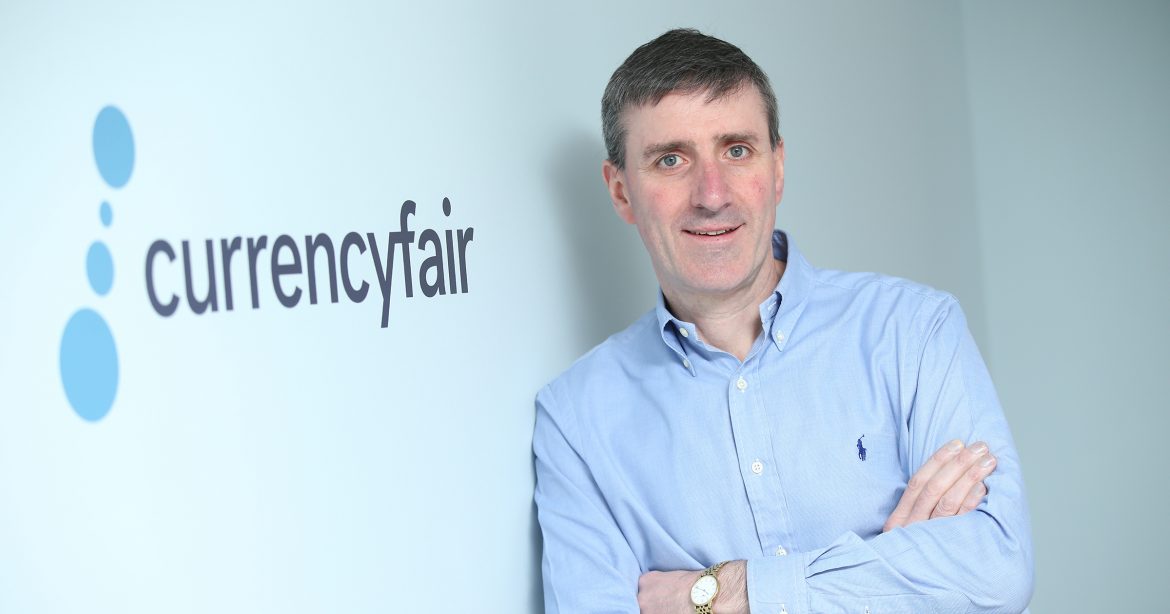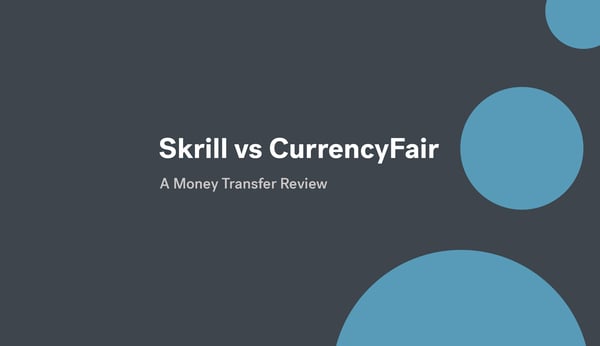Prepaid business card provider, Soldo, spoke to Paul Byrne - CEO of CurrencyFair, the international payments and foreign exchange platform. A seasoned CEO: CurrencyFair is his fifth software business. After a brief career at PwC, he has cemented his reputation with a thirty year C-Suite career in some of the most demanding B2B tech environments, including taking Trintech public and leading its transformation into a SaaS leader. He is not only the CEO and President at CurrencyFair but also a significant investor.
What is wrong with payments? Why has it been such a fragmented and messy process for almost half a century?
Consumer payments, for people buying online, is getting much easier, mostly thanks to credit and debit cards. People are very comfortable with that online. Where it gets complicated is when people want to pay by bank transfer, because it creates trust issues: if I send money from my bank account and I don't receive the goods, how do I get my money back?
Our service uses an escrow model for a marketplace or platform, so we can hold the buyer's money until the seller gives us proof of delivery. In that situation, we act as a trusted agent for all the parties in a transaction - buyer, seller and marketplace.
Another issue is documentation. For example, China is still the largest exporter of goods in the world but you can't get payment into China to a Chinese merchant without proper documentation. Compliance with Chinese regulatory law is a complicated process, the paper trail that goes along with business payments can be very challenging. But we are set up to manage that.
Another big issue is remittances, particularly the ‘last mile'. In many African countries, for example, there is no banking or ATM infrastructure, so how do you get money into the hands of the person who needs it? Many African countries have bypassed traditional banking and gone mobile-first. And in the Philippines, the most trusted establishments are pawn shops which act more like trading posts. It's highly manual and paper-driven yet trusted and effective. In a world of different financial institutions, the last mile is the biggest issue in remittances.
So every element of the payment chain, and every type of transaction (foreign exchange, paying for goods, holding deposits) has its own complications. We don't have all the answers, but we use technology to be super-efficient in making payments work in a trusted manner.
Trust is at the core of everything we do. Our Trustpilot and NPS scores are crucial success metrics for us. Creating that trust through providing a very valuable experience is what we strive to do every day - because it's not our money, it's our customers' money. We are the custodian of their money, helping them solve a problem in the most efficient way.
How does CurrencyFair help?
CurrencyFair is an international payments platform, servicing individuals and small and medium sized businesses. The company is ten years old; and was founded by two Australians living in Ireland who were trying to figure out a smart way to send money back to Australia. They ended up doing currency swaps with their personal friends, which led to the idea of a peer-to-peer currency platform.
Sending money internationally is expensive because most traditional business transfers use the Swift network, which is costly. Instead, we operate local clearing so, for example, if you're converting Sterling to Euros, you would deposit Sterling into your CurrencyFair account in the UK, conduct an exchange, and then euros will be available to you in real-time in the Eurozone. It's effectively a local transfer then to send euros onwards, which settles faster and costs much less.
We are licensed all across Europe, Australia, Hong Kong, Singapore and Canada, with more countries coming online in 2021 - 2022. With our platform, people transfer money abroad to pay foreign bills, receive their foreign pensions, pay employees or buy goods in the local currency and they do so cheaper and faster than through a bank. We are able to make this happen because we have built our own local clearing infrastructure.
Your market is very price sensitive. How do you get customers to use your service when they're immensely price-conscious?
Trust is at the core of everything we do. Our Trustpilot and NPS scores are crucial success metrics for us. Creating that trust through providing a very valuable experience is what we strive to do every day - because it's not our money, it's our customers' money. We are the custodian of their money, helping them solve a problem in the most efficient way. We focus on the speed with which money arrives at its destination and ensure that we are communicating regularly with the customer along the way. It is those consistent micro-experiences that build and maintain a trusted relationship.
When making a decision on who to exchange their money with, businesses tend to focus on the service they receive; while consumers put more of an emphasis on the absolute rate. Trust is equally important for both but for consumers, the risk they take with their own money is a much more personal and emotional decision. Our Customer Experience team understands that which is why our trust scores are so high.
We are competitive on price, and often we rank as the cheapest. But our customers want more than that, they want transparency and they want to understand what their fees are. Our go-to-market proposition starts with educating and informing. The biggest paint point we see for customers, is the one they don't realise exists. When we speak to new customers, it is not unusual for them to not know how much their bank is charging them and they are often shocked when we show them. Transparency is enormously important.
A general market challenge is that many startup fintechs come up with loss-leader pricing and we know they're losing money on every transaction; because their funding cycle is driven by users. Using this loss-leader approach to pricing may, in the short term, entices customers away from competitors but this strategy hurts their ability to deliver on quality service which in turn hurts retention.
So the proposition of their next round is based on the number of users rather than user value…
Yes, I believe it's a fundamental flaw in their VC funding model. It's not sustainable. We are profitable on every transaction. We're focused on building a business based on value - of which price is just one element of the proposition.
We see new entrants come into the market, offer very low prices, and then after three months be forced to increase their pricing to reduce their individual transaction losses. They end up losing credibility in their marketing channels. The companies that have been around a long time and which are sustainable generally don't try to compete exclusively on price; they're trying to help customers move away from the banking system to make payments in a more efficient, lower cost manner.
What's next for you? We are in a very different world to ten years ago. Open banking has lowered many barriers, so what direction are you taking?
The UK, for now, is our biggest market. But we're growing the fastest in Asia. We have several partners in China and Hong Kong; and have bought a business in Hong Kong which will allow us to expand across Asia. We secured licenses and launched in Singapore and Hong Kong last year, and we have an office in China. We do a lot of cross-border B2B payments into China on behalf of other businesses, and other payment companies work with us. We are also exploring new licenses across the region.
Every country in Asia has its own currency, rather than the homogeneous currency environment in Europe, so there's lots of opportunity there - plus huge growth in B2B traffic across Asia as it's host to significant economic development.
As regards Europe, we see Open Banking as a way to bring fintechs closer to banks. I believe we'll see more partnerships between fintech companies and banks, with more real collaboration. That's because foreign exchange has been a hidden profit driver for the banks for many years, but as customers recognise that there are better options on the market, banks will try to cooperate with fintechs to preserve some market share. We are part of many of those conversations.
The one thing banks have is access to classic, loyal customers. There's value for both sides in maintaining the customer connection but reducing the cost of transactions by using a platform like yours...
Yes. Co-operating with a platform like ours, a bank can be seen to be providing better value to their customers; and they have to do so because Open Banking is forcing banks to open up their user communities.
We're a bit of a way away yet from Open Banking truly benefiting consumers. I think the early wins will be completely new products rather than traditional foreign exchange or lending; because with new products there's no downside for the banks.
I can understand their point of view: why would they expose their customer base, which generates a huge amount of profit, to an outside disrupter who is looking to grab those customers? But there is a more holistic view of the world. Banks have a higher cost of compliance and a higher cost structure. They are probably better off partnering with a fintech to share reduced costs and generate higher profits for themselves, even if their revenue falls somewhat. That's the migration I anticipate we'll see.
I think we're at the very early stage of partnering across the ecosystem between banks and fintechs. And those conversations will go on for probably a couple of years before propositions that make sense economically for both parties are scaled to the mass market. I believe banks will actually become more profitable in the medium term through leveraging the infrastructure and expertise of platforms like CurrencyFair. Their revenue might be lower but vast costs will be taken out of their infrastructure and customers will get a better deal – and that's what engenders loyalty.
A general market challenge is that many startup fintechs come up with loss-leader pricing and we know they're losing money on every transaction; because their funding cycle is driven by users. Using this loss-leader approach to pricing may, in the short term, entices customers away from competitors but this strategy hurts their ability to deliver on quality service which in turn hurts retention.It's not sustainable. We're focused on building a business based on value - of which price is just one element of the proposition.
This is your fifth software business. What have you learned along the way?
Ultimately, business is about people. It's not about technology at all - that's just an enabler. Successful companies are built on two groups of people; your employees who solve a problem for the customers whose problems get solved. A community is created by building a trusted relationship between your employees and your customers. That's what makes a successful enterprise, and what allows a business to scale.
And scaling has become harder; because so many startups have come into fintech without much experience. There are so many heavily-financed first-time founders. Even though we're more experienced as a team, it's still challenging to scale up, because scaling in fintech is as much about capital as it is about the product or the customer. That's different to traditional B2B software businesses.
But I love building businesses and working with people. I also still find payments a remarkable industry. My very first company was a payments business and it's still very challenging. The majority of people underestimate how complicated payments actually are – they see it as a debit card or credit card. It's taken 40 years to get the Visa and Mastercard infrastructure to where it is today. The rest of the payments industry is much younger, and I find solving those cross-border challenges fascinating.
Tell me about the fintech scene in Ireland…
To me, Ireland is like a smaller version of London. Funding-wise, there's a leaner ecosystem: it's a small country, so most entrepreneurs here who are scaling seek funding abroad. Naturally, one would seek funding in a target operational country; so a business trying to break into the US would usually aim for a US VC; going into Europe one would seek money in London because there's a much bigger capital base and investor appetite in the UK.
But there are great ideas happening on the ground. Ireland as a country has always been strong on payments, going back to Trintech, the first company I was involved in, which went public in 1999. It was an early stage card-based payment merchant acquiring e-commerce business. Ever since, Ireland has evolved and innovated in payments. Many of the big global players have R&D centres in Ireland.
This article first appeared on Soldo, a solution providing multi-user business expense cards that empower employees by automating their expenses. You can read more interviews from Soldo's interview series here.











